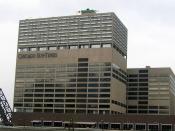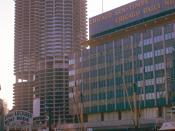In November 1978, the Chicago Sun-Times published the Abortion Profiteers, an investigative expose that revealed deplorable corruption and deceit in several swank Michigan Avenue abortion clinics. Five months earlier the Sun-Times had received a tip from a credible government source (who wished to remain anonymous) that it was possible four local abortion clinics were falsifying pregnancy tests so that they could perform unneeded abortions upon unsuspecting women. The Sun-Times began its investigation in conjunction with the Better Government Association (BGA). First, undercover investigators posed as women in need of pregnancy counseling and submitted male urine samples to the referral agencies for testing. After the referral agencies reported several of the male samples to be positively pregnant, they referred the reporters to Michigan Avenue clinics for abortions. The Sun-Times deepened its investigation by having its undercover reporters obtain jobs at several of the abortion clinics.
Four months of undercover investigation provided the Sun-Times with all the evidence it needed to expose the Madison Avenue clinics, although admittedly some of this evidence had been gathered through the illegal copying of medical files.
During this time the investigators learned chilling tales not only of false abortions, but late-pregnancy abortions, unlicensed medical personnel, Medicare fraud, improper anesthetic administration, and many other unprofessional and unethical practices. The publication of the Abortion Profiteers shocked the community and it ultimately resulted in the closing of two Michigan Avenue clinics, the imprisonment of one of the doctors, and new regulatory laws for outpatient abortion clinics. At the heart of this chilling tale are several issues that pose familiar ethical dilemmas for the media.
First, is undercover investigative reporting an ethical means of obtaining information? Some would argue no. Opponents of undercover journalism purport that it is unethical for reporters to falsely represent themselves in order to purposely deceive people of their occupation. They would argue that instead of sending undercover investigative reporters to the abortion clinic, the Sun-Times should have contacted the police and turned the investigation over to them. Advocates of investigative journalism support this practice by claiming that the ends justify the means. They feel that the reporters did not blatantly lie to the abortion clinics, they simply omitted some of the truth. Many undercover journalism supporters believe that the police are frequently hampered in their investigations by the often mundane process of obtaining search warrants and other technical police procedures. They typically view the situation from a utilitarian perspective in that they believe the majority of the people will benefit from undercover journalism.
If, for the sake of argument, undercover investigative reporting was deemed to be ethical in this situation, then it raises the question of whether the investigation was conducted ethically and professionally. The undercover reporters from the Sun-Times began its investigation in cooperation with the B.G.A. and I think that this was a good start. However, the reporters violated the law when they made unauthorized copies of more than one hundred medical records. While I definetely believe that breaking the law was absolutely unprofessional, I think that the investigators' actions are still arguably ethical. The offense of illegal copying appears minor in comparison with the atrocious acts that the abortion clinics were committing. The reporters defended their actions by claiming the need for evidence.
Another ethical question that this story poses is whether or not a reporter has an obligation to prevent harm to those around them. The undercover journalists from the Sun-Times interacted with many women at the abortion clinics who were being misled and given false pregnancies. While they did not participate in the actual abortion procedures, they did have contact with the patients both before and after the operation. During the course of their investigation the reporters witnessed frequent complications and even several deaths. Did the reporters have an obligation to these women? Some would argue that the journalists should have done more to prevent harm. The Sun-Times had learned within the first few weeks of its investigation that these false abortions were indeed being performed and it could have turned the investigation over to the police at that point. This would have protected many of the innocent women who were needlessly harmed (and killed) during the following four months. However, others would argue that the need for evidence justifies the additional four months of investigative work. They reflect the utilitarian perspective and state that the harm done to a few results in the protection of the many.
I also view this situation from a primarily utilitarian perspective. Although I feel that the journalists should not have illegally copied medical records and perhaps should have conducted a somewhat shorter investigation, in the end I believe that the ends justify the means. The Chicago Sun-Times reporters succeeded in uncovering a web of deceit and scandal that ultimately led to new laws to protect women in outpatient abortion clinics. Although I think that the investigation could have been more professional, in the end it resulted in greater protection for the most people.





